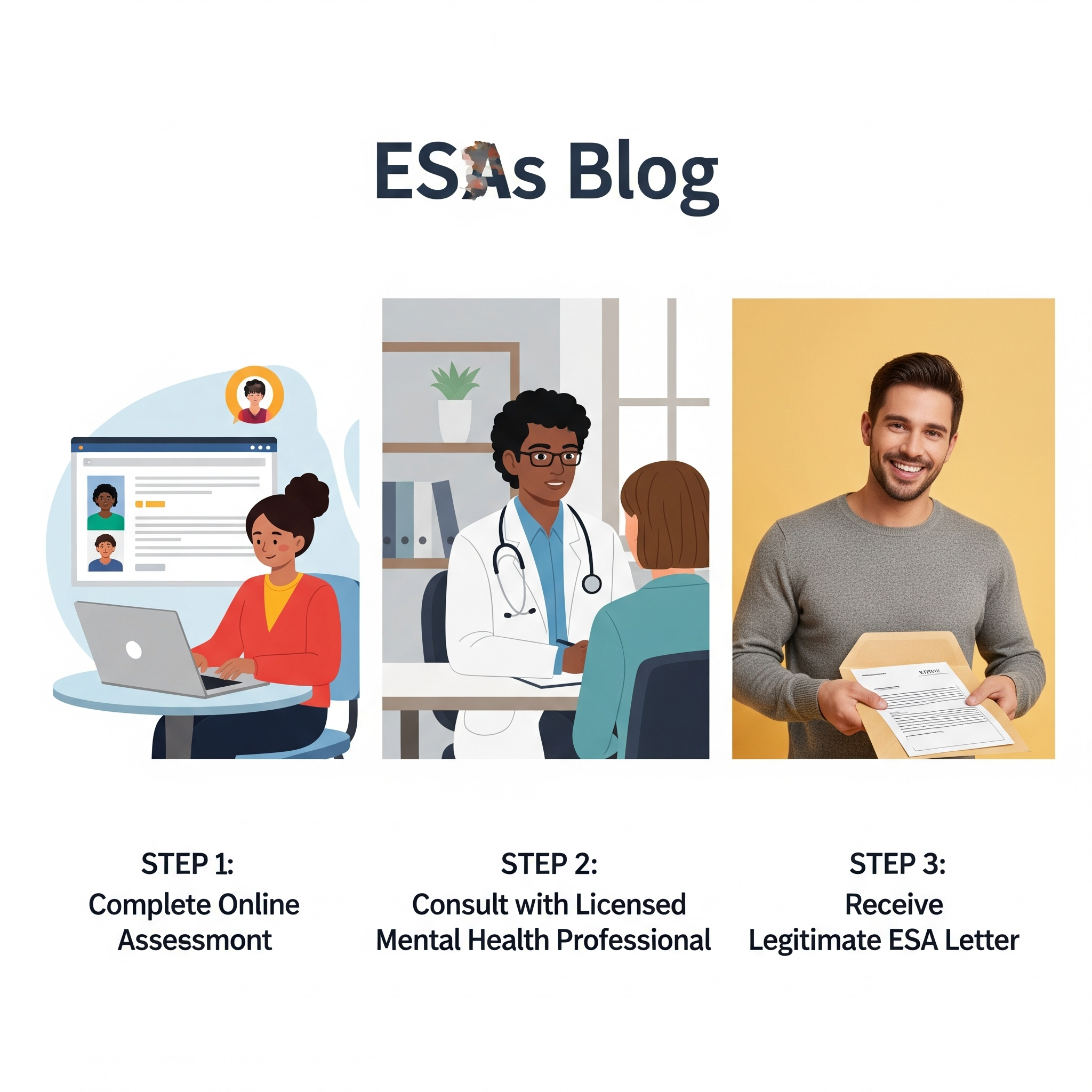For individuals managing mental health disabilities, an Emotional Support Animal (ESA) provides vital comfort, stability, and therapeutic benefits simply through its presence. Under the Fair Housing Act (FHA), individuals with disabilities are entitled to reasonable accommodations to live with their ESAs, even in housing with “no pet” policies or restrictions. However, effectively communicating this need to your landlord requires a formal and clear request. At CertifyESA, your trusted provider of legitimate ESA and PSD letters, we understand the importance of this process. This comprehensive blog post will provide a sample ESA housing request letter template, along with crucial guidance to ensure your request is professional, compliant, and increases your chances of a successful outcome.
Understanding Your Rights: The Fair Housing Act (FHA) and ESAs
Before drafting your letter, it’s essential to understand the legal framework that protects your right to an ESA in housing. The Fair Housing Act, enforced by the U.S. Department of Housing and Urban Development (HUD), prohibits discrimination in housing based on disability (U.S. Department of Housing and Urban Development, n.d.). Under the FHA, a landlord must provide a “reasonable accommodation” to a person with a disability, which can include making an exception to a “no pet” policy for an ESA.
Key points to remember about FHA and ESAs:
- Disability Requirement: You must have a mental or emotional disability that substantially limits one or more major life activities.
- Nexus: There must be a “nexus” or connection between your disability and the need for the ESA. The ESA must provide emotional support that alleviates one or more of the symptoms or effects of your disability.
- Reasonable Accommodation: The landlord must grant the accommodation unless it would impose an “undue financial and administrative burden” or fundamentally alter the nature of the housing operations, or if the specific animal poses a direct threat to the health or safety of others or would cause substantial physical damage to the property. These are high legal bars to meet.
- No Pet Fees: Landlords cannot charge additional pet fees or deposits for an ESA.
The Power of a Legitimate ESA Letter
The cornerstone of your housing request is a legitimate ESA letter from a Licensed Mental Health Professional (LMHP). This letter verifies your disability and the therapeutic need for your ESA. CertifyESA connects you with qualified LMHPs who conduct thorough evaluations and, if appropriate, provide legally compliant ESA letters. Without this letter, your request is simply for a pet, not a reasonable accommodation.
Sample ESA Housing Request Letter Template
Use this template as a guide, customizing it with your specific information. Remember to attach your legitimate ESA letter.
[Your Name] [Your Apartment Number/Address] [Your City, State, Zip Code] [Your Phone Number] [Your Email Address]
[Date]
[Landlord’s Name or Property Management Company Name] [Property Management Address] [Property Management City, State, Zip Code]
Subject: Request for Reasonable Accommodation for an Emotional Support Animal (ESA)
Dear [Landlord’s Name or Property Manager’s Name] or [Property Management Company Name],
I am writing to formally request a reasonable accommodation under the Fair Housing Act (FHA) to allow my Emotional Support Animal (ESA), [Your ESA’s Name and type of animal, e.g., “my dog, Max” or “my cat, Luna”], to reside with me at my residence located at [Your Full Address].
As an individual with a disability, the presence of my Emotional Support Animal is medically necessary to provide me with therapeutic benefits and alleviate symptoms associated with my mental health disability. My ESA, [Your ESA’s Name], provides emotional support that directly contributes to my ability to use and enjoy my dwelling.
Attached to this letter, you will find a legitimate Emotional Support Animal letter from my licensed mental health professional, [Licensed Mental Health Professional’s Name]. This letter verifies my disability and the necessity of [Your ESA’s Name] as a reasonable accommodation under the Fair Housing Act.
I understand that your property may have a “no pets” policy or specific restrictions regarding animal size or breed. However, under federal fair housing laws, an Emotional Support Animal is not considered a pet and is exempt from such policies when necessary as a reasonable accommodation for a disability. Furthermore, I understand that no pet fees or deposits may be charged for an Emotional Support Animal.
[Optional: Add a brief sentence about your ESA’s good behavior, if applicable, e.g., “My ESA is well-behaved, house-trained, and will not cause any damage to the property or pose a nuisance to other residents.” Keep this brief and factual, avoid making promises you can’t guarantee.]
I am committed to being a responsible animal owner and ensuring that [Your ESA’s Name] is properly cared for and does not disturb other residents or damage the property.
I kindly request that you review my request and the accompanying documentation. I am available to discuss this matter further at your earliest convenience and provide any additional information you may reasonably require, consistent with fair housing regulations.
Thank you for your time and understanding in this important matter.
Sincerely,
[Your Signature (if sending hard copy)]
[Your Typed Name]
Enclosure: Legitimate Emotional Support Animal Letter from Licensed Mental Health Professional
Crucial Steps and Considerations for Your Request:
- Obtain a Legitimate ESA Letter FIRST: This is non-negotiable. Do not send this request letter until you have a valid ESA letter from an LMHP. CertifyESA connects you with qualified professionals for this crucial document. An LMHP will assess your condition and determine if an ESA is clinically necessary.
- Send in Writing: Always submit your request in writing. This creates a clear record of your communication.
- Proof of Delivery: Send your letter via certified mail with a return receipt requested, or via email with a read receipt. Keep copies of everything for your records.
- Be Professional and Courteous: Maintain a respectful and calm tone in your letter and all communications. This is a formal request for an accommodation, not a demand.
- Focus on “Reasonable Accommodation”: Frame your request in terms of a “reasonable accommodation” under the FHA. This is the legal term landlords understand.
- Do NOT Disclose Your Specific Diagnosis: Your ESA letter should confirm you have a disability and the need for an ESA. You are not required to disclose the specifics of your mental health condition to your landlord.
- No Pet Fees: Clearly state your understanding that no pet fees or deposits apply to ESAs.
- Be Prepared for an “Interactive Process”: Your landlord may ask for further clarification. They can verify that you have a disability and that the animal provides support related to that disability. They cannot ask for your medical records or the specifics of your diagnosis. Be prepared to respond promptly and cooperatively.
- Timeframe for Response: While there’s no strict federal deadline, HUD guidance suggests landlords should respond to reasonable accommodation requests in a timely manner. If you don’t hear back within 10-14 business days, a polite follow-up is appropriate.
- What if Your Request is Denied? If your legitimate request is denied without valid reason, you have recourse. You can file a complaint with HUD, or contact a fair housing advocacy organization or an attorney specializing in housing discrimination.
Why CertifyESA is Your Trusted Partner
CertifyESA is committed to empowering individuals with mental health disabilities by providing access to legitimate ESA letters. Our process connects you with licensed mental health professionals who conduct thorough evaluations, ensuring that any letter issued is compliant with federal regulations. We prioritize ethical practice, client privacy, and accurate information, so you can confidently make your housing request.
Conclusion: Advocating for Your Right to Comfort and Stability
Your home should be a place of comfort and security, and for many, an Emotional Support Animal is fundamental to achieving that. By utilizing this sample letter template and understanding the legal framework provided by the Fair Housing Act, you are well-equipped to formally request the accommodation you need. Remember to obtain your legitimate ESA letter from a trusted source like CertifyESA first, and approach the process with professionalism and clear communication. Your ESA is a vital part of your well-being, and advocating for your right to have them by your side is a step toward greater stability and peace of mind in your home.
Reference:
U.S. Department of Housing and Urban Development. (n.d.). Fair Housing Act. Retrieved from [Insert relevant HUD webpage URL about the Fair Housing Act here, e.g., https://www.hud.gov/program_offices/fair_housing_equal_opp/fair_housing_act]





